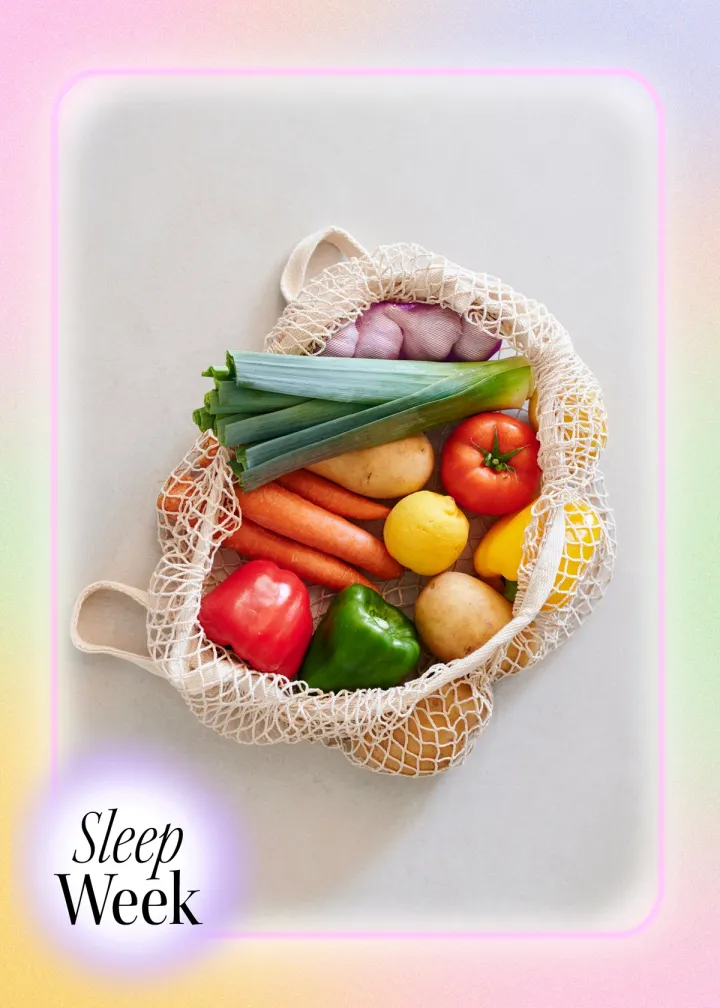
The Perfect Day of Eating for a Good Night’s Sleep, According to a Dietitian
Food and sleep are closely intertwined.
When it comes to sleep, we know that food choices can significantly impact our sleep including how long it takes to fall asleep, the duration of sleep and the quality of sleep.
It’s a common misconception that it’s only the foods/beverages we consume in the evening that will impact sleep. What we eat and drink earlier in the day will also have an impact on sleep hours later.
So, let’s go through what a perfect day of eating for a good night’s sleep looks like and why.
Breakfast
Overnight apple, cinnamon, and walnuts oats and a small coffee
Overnight oats with grated apple, cinnamon, walnuts, milk and chia seeds is a great way to start off the day for sleep success. Oats are a great low GI carbohydrate, meaning they provide a nice gradual release of blood glucose (sugar) to provide longer-lasting energy levels to fuel your morning. Maintaining stable blood sugars across the day will assist with preventing the 3 pm slump that often results in reaching for higher-sugar foods to provide a quick fix of energy, which can negatively impact sleep later on. If you’re a coffee drinker, then periodising caffeine is important for managing sleep, so including it with breakfast is perfect.
Morning snack
Protein bar with a small coffee
If you tend to drink multiple cups of coffee per day, try capping it to 2 caffeinated coffees and have your last one no later than midday. This is because caffeine can have detrimental impacts on sleep. We all metabolise caffeine at different rates, but it takes approximately 8-12 hours to metabolise, with an average half-life of 4 hours (where caffeine reaches half of its peak concentration). So, by having your second caffeinated beverage mid-morning, it means you’ll still reap the performance benefits of it well into the early afternoon with it still being metabolised by the time you go to bed.
Pairing your coffee with a protein bar (such as Fodbods or Carman’s) is great (and delicious!) way to manage appetite. Many of us tend to ‘back end’ our protein intake, where we don’t eat enough protein early in the day and have a large protein hit in the evening. Including protein regularly across the day will assist with managing appetite and blood glucose control, preventing over-eating in the afternoon and/or evening.
Lunch
Wholegrain egg and salad sandwich and a square of dark chocolate
Enjoying a simple wholegrain egg and salad sandwich with some avocado is a perfect lunch option to sustain your energy levels throughout the afternoon. If you don’t like egg you can swap it for salmon, tuna, tofu, falafel, or chicken. If you enjoy dark chocolate, it’s best to have a small serve with lunch, rather than after dinner. Dark chocolate is high in caffeine, with 50g (two rows) containing the same amount of caffeine as more than half a shot of coffee. It also contains sugar, which we want to avoid in the evening due to the negative impact it has on sleep.
Afternoon snack
Hummus and veggie sticks with a herbal tea or arepa drink
Hummus and veggie sticks are a great way to incorporate some extra colour and legumes into your day. Legumes have a very low GI, so including hummus as a snack is perfect for sustaining your energy levels until dinner time. Veggie sticks and hummus are also both a good source of fibre, which will help keep you fuller for longer. Arepa is an excellent drink to include for those who want a performance boost without the caffeine.
Dinner
Grilled garlic and herb tofu with pearl barley, avocado, and roast vegetables
This evening meal is perfect to help promote a restorative sleep. Tofu is an excellent source of protein and avocado is a great source of omega-3 fatty acids, which will help keep you satisfied throughout the night (no one wants to wake up hungry!). Including a source of quality carbohydrates with your evening meal, such as pearl barley, is important when it comes to sleep. Carbohydrates stimulate the release of tryptophan, which is a precursor to melatonin, which plays a key role in both falling asleep and staying asleep. The meal wouldn’t be complete without some colour! Including ½ plate of vegetables is key for both providing a hit of antioxidants and micronutrients to nourish your body, as well as fibre and volume to keep you satisfied.
Dessert
Greek yoghurt with mixed berries and a peppermint tea
If you’re still hungry after dinner, including some Greek yoghurt with berries and a herbal tea is a good choice to provide some quality protein and a small amount of carbohydrates. Just ensure you aim to have a 2–3-hour break from when you finish eating to when you go to bed. Eating too close to bed is likely to negatively impact sleep as well as digestion.
Chloe is an Accredited Practising Dietitian (APD), Advanced Sports Dietitian and founder of Verde Nutrition Co. You can follow her on Instagram here and at Verde Nutrition Co here.
Enjoyed This?
Discover more food-related articles.










